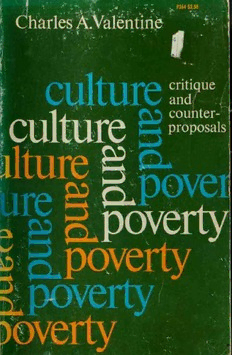
Culture and Poverty: Critique and Counter-Proposals PDF
Preview Culture and Poverty: Critique and Counter-Proposals
P364 $2.50 A Charles Valentine culture CULTURE POVERTY and CULTURE POVERTY Critique and Counter-Proposals Charles A. Valentine THE UNIVERSITY OF CHICAGO PRESS CHICAGO AND LONDON ISBN: 0-226-84545-1 (clothbound); 0-226-84547-8(paperbound) LibraryofCongress Catalog CardNumber: 68-16718 THE UNIVERSITY OF CHICAGO PRESS, CHICAGO 60637 The University ofChicago Press, Ltd., London © 1968by The UniversityofChicago Allrights reserved Published1968 Fifth Impression 1972 Printedin the UnitedStatesofAmerica Affectionately andRespectfully Dedicated To My Mother And the Memory ofMy Father Preface This is an ambitious essay. It is ambitious because in it I have triedto go beyond what has already been said on those much- discussed subjects, the poor and their ways oflife. Moreover, I have attempted the difficult task ofwriting both as a scholar and as acitizen, hopingto address not onlyacademicorother specialists butfellowcitizens as well. This attempt stems from my strong convictionthat there must be many lines ofmutual relevance between two spheres that are sometimes artificially separated. The first of these is the realm of fact-finding, systematic knowledge, and theory-building in the human sci- ences. The secondis the sphere ofsocialpolicy, political prob- lems, and ideological issues. So the following pages contain considerable commentary on social problems and questions ofvaluejudgment related to poverty. I have tried to highlight some ofthe many interconnections ofthese concerns and the problems of gaining knowledge and understanding of the poor and their place in society. The basic subject matter treated here is the work ofprofessional specialists in several ofthe human sciences. Particular attention is given to impli- cations of this work for more general problems that affect everyone in society, directly or indirectly. In addition to beingambitious, this effortis sometimes pre- sumptuous, in the sense ofbeing assertive beyond the bounds of modesty often observed in academic writing. Clearly, manyspecialists,includinganumberwhoseworksareanalyzed critically in the following chapters, have greater knowledge and experience of various matters discussed here than I. I have nevertheless presumed to comment, sometimes boldly, viii Preface on both scientificand ideological issues raised in the works of these experts. Four convictions have prompted me to do this. First, I believe that practical political problems and ideo- logical issues stemming from the continued existence of poverty in the contemporary world will drastically determine the immediate future ofsociety. Second, I hope that scholar- ship and science can contribute to the constructive resolution ofthese problems, but I fear that so far the net effect ofpro- fessional expertise in these fields has been predominantly pernicious. Third, I am convinced that these difficulties have received far too little attention and discussion, with the dangerous consequence that ill-founded conclusions and recommendations from the academic experts are being ac- cepted and acted upon by the public and policy makers alike. Finally, with considerable hesitation and anxiety, I have reached the judgment that my own background and experi- ence, despite substantial gaps and deficiencies, are sufficient so that I cannot evade the citizen's obligation to speak out. The last point perhaps requires that the reader be given more than the usual minimum basis for making his own evaluation of the author's qualifications. By this I mean a basis apart from the conventional indications offormal pro- fessional status or the internal evidence of the pages which follow. I have had no extensive career ofsystematic firsthand research among the poor. Since childhood, my principal direct exposure to poverty in our own society has been through intensive participation in the civil rights movement in several American cities over a period of more than five years. While this movement, of course, has not often been predominantly populated by the poor, nevertheless this ex- My perience has been relevant. experience in this context has involved systematic research, including some informal field work. Most ofmy formal knowledge ofpoverty in America, however, stems from reading and library research. My ethnographic experience as an anthropologist was gained in a quite different, though not wholly irrelevant, con- Preface ix text. On two expeditions to the Pacific island territory ofNew Guinea, I was able to study the effects of poverty and rela- tive deprivation on native peoples in the highly stratified plural society of a colonial dependency. It should be clear, then, that my arguments for anthropological approaches to poverty studies in complex societies cannot be supported by what would perhaps be the ideal validation. That is, I cannot yet report results from an urban ethnographic study of my own among the poor. Hence the research suggestions made here necessarily have a somewhat prospective, programmatic quality. It may well be argued that the prospective research should have been carried out before I composed this essay. While there is merit in this argument, the urgency ofthe con- cerns and convictions expressed above ultimately persuaded me to disregard it. Many people have been most helpful and generous with their time and knowledge in discussing the issues raised here. I have learned from each ofthem, even though I have not al- ways accepted their suggestions for improvements. Among those who helped most in this way are John Atkins, Helen Gouldner, James and Rose Marie Jaquith, Joseph Kahl, Eleanor Leacock, Lee Rainwater, Kenneth Read, Harry and Irma Rosen, Steven Schwartzchild, Michael Seltzer, Edward and Joan Singler, Norman Whitten, and Alvin Wolfe. Peggy Stinson and Irene Brown patiently and efficiently supervised the preparation ofdrafts. I am indebted to the Department of Sociology-Anthropology, Washington University, for funds My supporting this preparation. most devoted discussant, effective editor, tireless typing aid, and ceaseless source of support, however, has always been my wife Betty Lou. Charles A. Valentine
